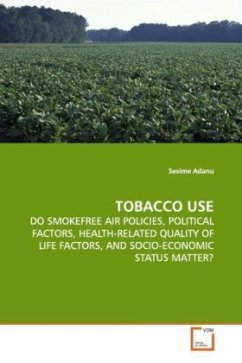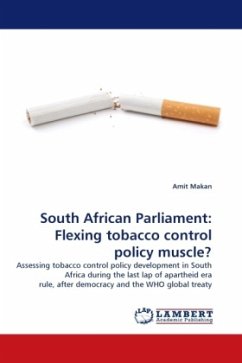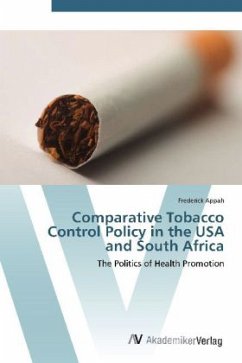Over the past years, tobacco use has become a major
health policy concern in the U.S.. Tobacco use
causes preventable diseases which lead to high
health care costs. These diseases in turn reduce
productivity on the labor force. Furthermore,
secondhand smoke threatens the health of nonsmokers.
Each year, over 400,000 tobacco users in the U.S. die
from tobacco-related diseases and nearly 50,000 adult
nonsmokers are reported dead from secondhand smoke.
This book examined four major factors related to
tobacco use namely: smokefree air policies,
political factors, health-related quality of life,
and socioeconomic status. As serious as the problem
is, the literature is rare on the impact of
political factors and smokefree air policies on
tobacco use compared to the other factors. This
book, therefore, offers a unique perspective on the
understanding of tobacco use and its related policies
in the U.S.. The findings in this book unearth some
critical issues in the fight against tobacco use and
should be useful for those in academe, students
interested in health policy, legislators, anti-
tobacco groups, private and government officials
addressing health policy issues.
health policy concern in the U.S.. Tobacco use
causes preventable diseases which lead to high
health care costs. These diseases in turn reduce
productivity on the labor force. Furthermore,
secondhand smoke threatens the health of nonsmokers.
Each year, over 400,000 tobacco users in the U.S. die
from tobacco-related diseases and nearly 50,000 adult
nonsmokers are reported dead from secondhand smoke.
This book examined four major factors related to
tobacco use namely: smokefree air policies,
political factors, health-related quality of life,
and socioeconomic status. As serious as the problem
is, the literature is rare on the impact of
political factors and smokefree air policies on
tobacco use compared to the other factors. This
book, therefore, offers a unique perspective on the
understanding of tobacco use and its related policies
in the U.S.. The findings in this book unearth some
critical issues in the fight against tobacco use and
should be useful for those in academe, students
interested in health policy, legislators, anti-
tobacco groups, private and government officials
addressing health policy issues.








